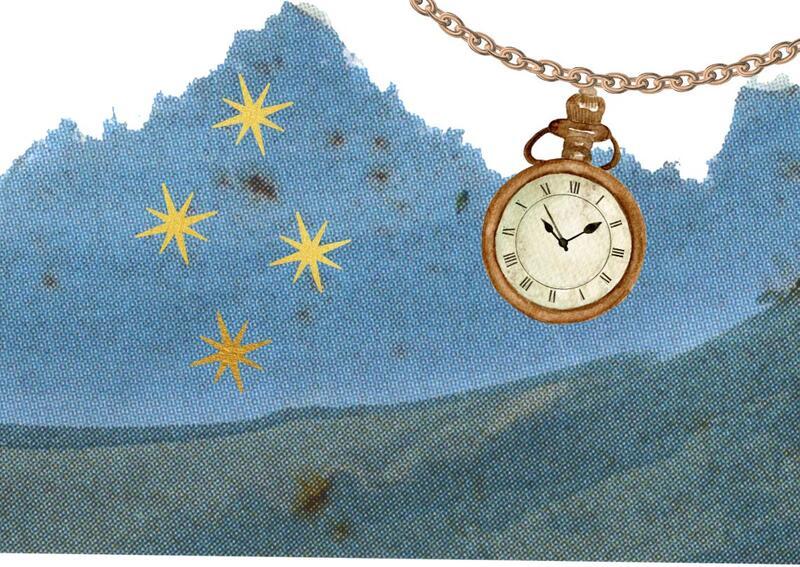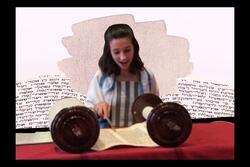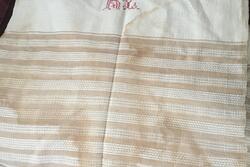Carrying Family Around My Neck
“There are four clocks in the room, but one is on the desk,” one of my fourth-grade students remarks. My kitah is in session for our first Hebrew class after summer break, and everyone is adjusting to our new classroom.
“There are actually five clocks in the room,” I respond, lifting a golden chain from my neck. It’s the first real piece of jewelry I was given, and the pièce de résistance is the golden clock at the bottom. I pick it up and show both sides to the student; one side shows a clock, and the other is glass. Through the glass, the viewer can see all the mechanisms that make the hands move. After I set the necklace to 10:15, I turn the top three times. The miniature cogs jump to life, each moving part doing its job to keep the clock turning for the next several hours.
“Wow, is that real?” another student asks.
“Not the pearls,” I say, turning the necklace over to show the spots where the white paint has been rubbed off, “but the gold is. It was my grandma’s. She gave it to me when I was your age.”
In fifth grade, when I received the necklace, I didn’t appreciate it fully. I rarely wore it; I thought it was cool, but it was an accessory and nothing more. As I got older and grew to appreciate my grandmother’s bravery, I started to appreciate the piece, and it became a staple of my wardrobe. It may not have meant much to my grandma, but that only gives it greater value to me.
My grandmother was very successful; she was one of the first women to graduate from her law school, which she did while raising three children. She became a managing partner at her law firm at a time when the company still hosted meetings at men’s clubs. She was left out of meetings because her very presence was unconventional. Despite adversity, she rose through the ranks and trusted in her skills. She is my role model. Wearing the necklace, I feel her bravery.
My grandmother isn’t the only thing that makes the necklace special, although she certainly is one of them. My great-grandfather, her father, had a great fondness for clocks and timekeeping. So much so that he wrote a book on the subject. It’s the only book of his that I have read. I had the honor of meeting him when I was a young child. He defined Judaism for my family. He lived through World War II and, at a time when many chose to give up Judaism for their safety, my grandfather remained very intentionally Jewish. When my great-grandmother was diagnosed with cancer, he promised God to daven every week if she recovered. She recovered and he davened. In a time that was depressing for the Jewish people, my great-grandfather was always hopefully Jewish. I often think his love for timekeeping was because he knew how little time many Jewish people had, so he bought watches and wrote about time because his Judaism made him cherish it.
The women of my family often wear necklaces to honor and connect with their ancestors. My other grandmother, Nana, wears her mother’s pearls while my aunt, mother, and sister have a sisterhood-of-the-traveling-pants style necklace that they swap for big events. It has a diamond from my great-great-grandmother on my mother’s side, set in a detailed silver square. It’s beautiful and simple, and wearing it makes them feel love and connection with her. My mother also chooses to hold her family near and dear through her most classic necklace: a necklace with five perfectly circular diamonds, connected by their silver molding, on a silver chain. Each diamond is tiny, and from far away it looks like just a small sparkle. Their pointed tips, silver setting, and quality match that of her wedding ring. One of the diamonds on it is for the man who gave her both the necklace and the ring; her husband. The others are for the four children she raised with so much love. When I was young, my parents said we had all once been just “a sparkle in [their] eyes”, and now we rest as sparkles on my mother’s neck.
In my family, necklaces are more meaningful than any other piece of jewelry. It can be because of who you share them with, who gave them to you, what they are, or where you wear them. Necklaces, for me, honor the women who make me who I am.
While many people choose to wear rings, bracelets, or earrings to represent who they are, I have always favored necklaces. A necklace, unlike other jewelry, is worn near one’s heart. To me, a necklace near the heart means that the object signifies something that someone loves and chooses to bring with them, whether that be a person, their family, or their history. Almost every day, I carry my Judaism and my feminism by my heart.
This piece was written as part of JWA’s Rising Voices Fellowship.








Beautiful writing, beautiful story…poignant… and meaningful.